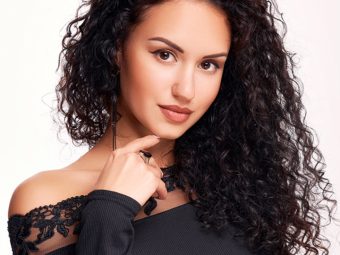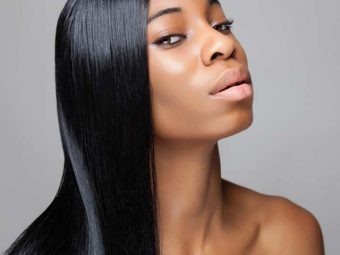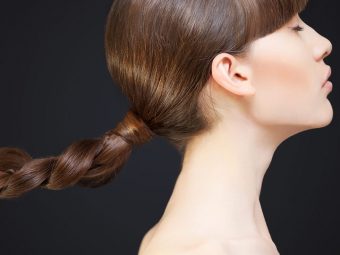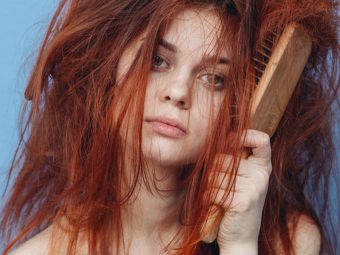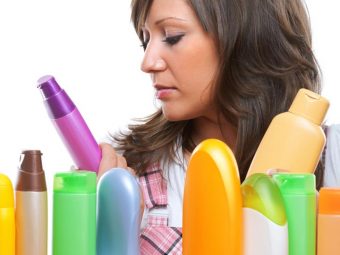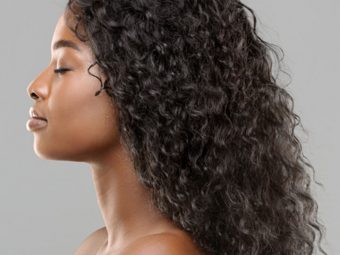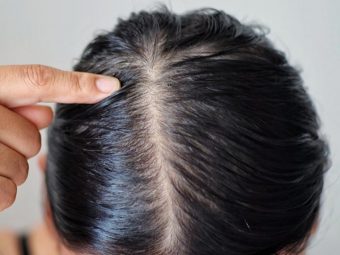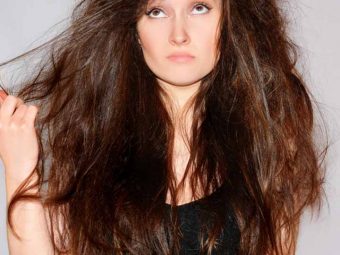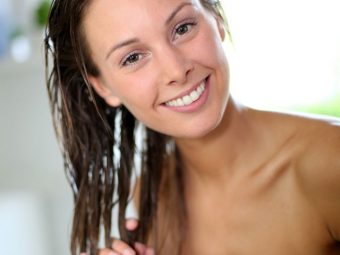How To Wash Hair Without Shampoo: 7 Simple Ways To Try
You don't always need a chemical-based product to wash your hair, and here's how.
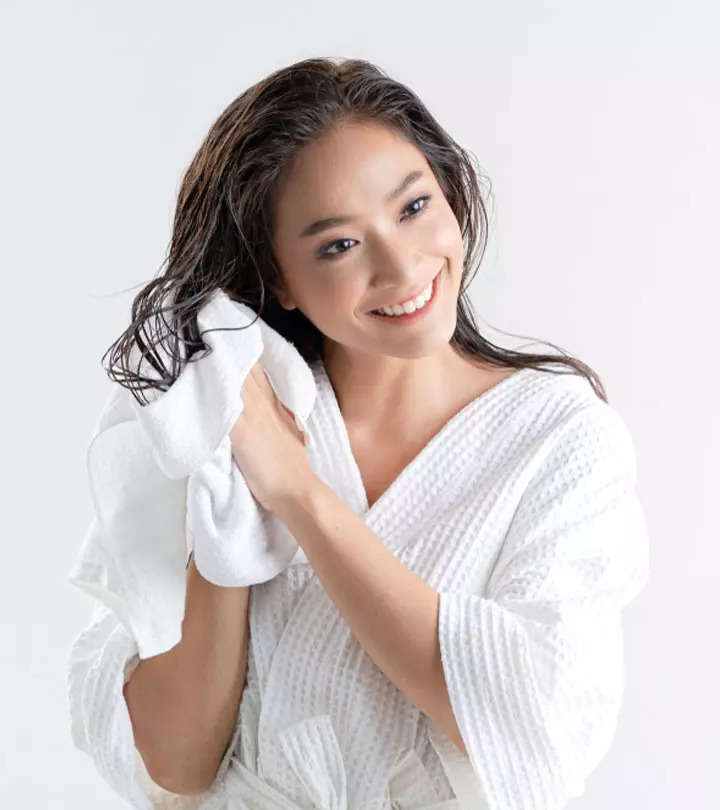
Shampoos not only make your hair look great but may also damage it. The harsher ingredients and other chemicals in shampoos may disturb the scalp’s natural balance. But you can’t wash hair without shampoo, can you? Or are there alternative methods to achieve healthy and shiny locks naturally? This article explores why you should avoid shampoos and the many ways you can wash your hair without them. Keep reading.
In This Article
Why You Should Avoid Shampoo Once In A While
Shampoos contain detergents that clean your hair easily. But certain ingredients in shampoos can cause scalp irritation and make your hair dry and brittle. They may also cause hair loss in the long run. Skipping shampoos has some benefits:
- Less exposure to potentially harmful chemicals
- Better hair volume
- Improved scalp health
- Improved production of natural scalp oils
There are quite a few natural alternatives to shampoos. These are easy to use and promote long-term hair and scalp health.
7 Ways To Wash Hair Without Shampoo
1. Baking Soda
Baking soda (sodium bicarbonate) has a pH of 9. It works as an effective cleanser and acid neutralizer. Its alkaline pH helps remove build-up and dirt from your scalp. It works great for oily, straight hair. Here are some advantages of using baking soda as an alternative to shampoo.
- It is said to possess antifungal properties that help fight against dandruff.
- It protects your hair from environmental pollutants.
- It removes excess oils and restores hair shine.
- It does not weigh your hair down.
- It soothes an itchy scalp and softens your hair.
- It adds volume and body to your hair.
Your scalp has a standard pH of 4 to 5. But baking soda will likely throw your scalp pH out of balance. Hence, you will have to neutralize this effect with an apple cider vinegar rinse.
2. Apple Cider Vinegar
Apple cider vinegar (ACV) has a pH of 4.5 to 5.5, similar to that of the scalp. This pH brings your hair back into balance and adds strength. The vinegar is also believed to control bacterial infections that may otherwise lead to scalp issues. ACV specifically offers relief to oily hair. However, pure ACV will degrade your hair. Hence, dilute it with a carrier oil before applying it to your scalp.
3. Lemon Juice
Lemon juice also has a low pH and helps restore the natural hair balance. It also boosts scalp health. It can treat dandruff and makes your hair thick and shiny. It is a natural degreaser and works perfectly for washing your hair. Lemon juice is also suitable for oily hair or hair with no volume. Its astringent properties help remove the excess oil and dirt from the scalp.
If you have oily hair, you may squeeze the juice of a lemon into a cup of warm water. Apply the mixture to your scalp and massage for some time. Rinse.
4. Bentonite Clay
Bentonite clay has great moisturizing properties and draws out excess oil and dirt. It has been widely used as a hair cleanser and softener (1). It offers deep moisturization and helps treat dry and damaged hair. It also reduces hair frizz and protects hair from heat damage. You can make this clay into a paste and apply it along the length of your hair. You may use an apple cider vinegar rinse as a conditioner.
5. Light Rye Flour
Light rye flour works for all hair types and is a very mild hair wash. It helps treat itchy and dry scalp, dandruff, and greasy hair. It is packed with minerals and vitamins essential for your hair. It works without disturbing the natural pH balance of your hair. This flour is also rich in vitamin B5 known for its anti-inflammatory properties.
You can mix two tablespoons of light rye flour with water and apply the paste to your hair evenly. Leave it on for 20 to 30 minutes and rinse with water.
6. Dry Shampoos
Shampooing your hair every day can make your hair dry by stripping off the natural oils from your scalp. So, instead of washing your hair daily, you can use dry shampoos. These shampoos work by absorbing the excess oils from your scalp and hair between your hair wash days without leaving your hair dry and messy. Also, dry shampoos offer wonderful fragrances and make your hair look fresh.
7. Co-Washing
Co-washing, or conditioner-only washing, suits those with drier or curlier hair. Wash your hair with a conditioner like you would with a shampoo. Let the conditioner sit for a couple of minutes over your hair. Rinse with lukewarm water. Remember not to use hair care products with silicones. Products with silicones may make your hair smooth and shiny but also leave a residue.
Benefits Of Washing Hair With Only Water
Washing your hair with only water is a natural alternative to shampoos. Frequent washing of hair with shampoos can strip off the natural scalp oils and lead to product build-up. Water-only washing eliminates the use of sulfates in shampoos that otherwise make your hair brittle and dry. (if you have dry hair and scalp). It also helps in the even distribution of the hair’s natural oil (sebum).
If your hair is tangle-prone, washing with water alone along with a deep conditioning hair mask can help. The hair strands have a rough surface. With more natural oils left on the scalp, your hair strands will glide over each other and not tangle as much.
Sometimes water-only washing works best on curly, thick, coily, and coarse hair types. These hair textures are often prone to dryness, and using water alone helps retain hair moisture. A deep conditioning mask will help seal the moisture after washing.
Other Tips For Washing Hair Without Shampoo
- Oil-based cleansing can promote strong and healthy hair by providing moisture to the cuticles.
- Dry shampoos can absorb excess oil and grease from your scalp and give your hair a refreshed look.
- Aloe vera is another natural alternative to shampoos and is known for its moisturizing properties. It has antibacterial and anti-inflammatory properties and can help prevent dandruff. Apply aloe vera gel to your scalp. Massage it thoroughly for a few minutes and rinse your hair with lukewarm water.
Shampoos help clean your hair and scalp. However, they may also damage it as shampoos contain harsher ingredients and chemicals. Therefore, you can skip shampoos once in a while. It will help improve your scalp health and boost the production of natural scalp oils. You may follow the tips mentioned above to wash your hair without shampoo. Observe your hair and how it reacts after using the suggested alternatives. If you notice any positive results, continue using them to achieve strong, healthy, and luscious hair.
Frequently Asked Questions
How long does it take for your hair to adjust to no shampoo?
It may vary from one week to six months, depending on your hair type, previous products used, and scalp condition.
Is it okay to wash hair once a week?
Yes. If your hair and scalp are dry and don’t attract much dirt and grime, it is okay to wash your hair once a week. You can increase the frequency if you have oily hair.
Does washing hair less make it healthier?
It is all about striking the right balance. You should wash your hair as often as you feel the need to, as dirty and oily tresses may lead to scalp-related problems, hair fall, and other issues.
Will your hair grow faster if you don’t use shampoo?
No. Shampooing does not have any effect on your hair growth. It is because the process of hair growth is internal, while shampooing only cleanses the surface of the hair and scalp.
Key Takeaways
- Baking soda is an effective cleanser and acid neutralizer that can replace shampoo. It works great for oily, straight hair.
- Bentonite clay is used as a hair cleanser and softener as it draws out excess oil and dirt from the scalp. It can be a good alternative to shampoo.
- Washing your hair with only water is a natural alternative to shampoos as it eliminates the use of sulfates.
Sources
- Bentonite Clay as a Natural Remedy: A Brief Review
https://www.ncbi.nlm.nih.gov/pmc/articles/PMC5632318/





